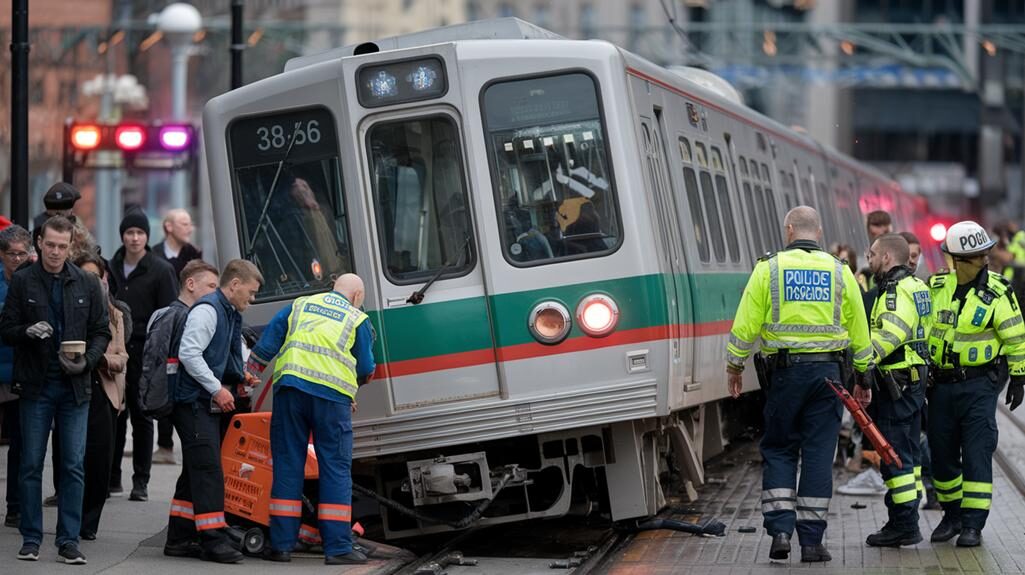 Using public transportation in Massachusetts is usually a safe and simple way to commute to work, attend public events and shop without the inconvenience of having to navigate unfamiliar roadways or worry about the cost of parking. The Massachusetts Bay Transport Authority handles a variety of public transportation types and knowing how to proceed if an injury occurred on or around any public vehicle may help you feel more confident as you move forward with filing a report or if you decide to file a personal injury lawsuit against the MBTA.
Using public transportation in Massachusetts is usually a safe and simple way to commute to work, attend public events and shop without the inconvenience of having to navigate unfamiliar roadways or worry about the cost of parking. The Massachusetts Bay Transport Authority handles a variety of public transportation types and knowing how to proceed if an injury occurred on or around any public vehicle may help you feel more confident as you move forward with filing a report or if you decide to file a personal injury lawsuit against the MBTA.
Injury Types
The MBTA has public portals and stops all over Boston and offers a variety of transportation options, including:
- Buses
- Subways
- Commuter Rails
- Ferries
- Shared ride vehicles for the disabled
While these services provide convenience, you might also experience an unexpected injury while aboard any one of them. Slips, trips and falls may occur on almost any moving vehicle, or you may experience an injury if a bus or shared ride vehicle collides with a large commercial truck. Operator error and carelessness can also cause accidents that result in neck or spinal injuries. From broken bones to brain injuries, you might become hurt in a variety of ways and find yourself unable to work or care for your family. If this should occur, reporting the accident as soon as possible is an effective first step when you decide to seek compensation for your medical bills.
Reporting An Incident
Alerting the MBTA to an accident or injury right away can help you secure proof that you reported the problem to the organization’s customer support team and provided support with details of the incident. You can include a variety of details, including:
- The date and time of the accident
- The nature of your injuries
- What you witnessed/experienced
- The number of the transport vehicle/transport type
When you report the incident, try to offer as many specific details as possible. It may take several days for the MBTA to respond, and you may want to retain the reply for future action.
Gathering Accident Information
Once you complete your accident report to the MBTA, you may want to gather information relating to the accident. The more details you can offer the organization and later, an attorney if you choose legal avenues to gain compensation for your accident. This may seem like a daunting process, but taking matters step by step can help you feel more confident.
Speak To Witnesses
If the accident resulted in police involvement, you can request a copy of the accident report and ask for the names of any witnesses who saw it occur. Gathering multiple accounts might help strengthen your case, especially if you lost consciousness during or directly after the incident.
Asking any witnesses what they saw before the incident occurred and whether they have any distinct information that could help you prove the vehicle operator acted with negligence or carelessness. For example, if a bus driver made an illegal left turn that resulted in an accident and a witness sitting in the forward section saw it happen, he or she may be able to tell you the exact circumstances and why the driver might have committed such an unsafe act.
Review the Police Report
As you collect details about the accident, reviewing the police report can support your case and provide you with added information you may not have been aware of previously. You can also review the report for clarity and mark any possible errors as well. You may want to keep in mind, however, that a police report records the facts of an accident and may not place blame.
Obeying Statutes
Massachusetts law allows you up to two years to file a personal injury claim under the Tort Claims Act, no matter the nature of your injury. If other individuals on the public transport vehicle also sustained physical harm, then you may also create a legal case with multiple plaintiffs. Remember that you must submit your claim in writing, so organizing your case and its details in a timely manner can prevent delays that could affect the outcome. Generally, the sooner you act after the accident, the fresher the details in your mind and in the minds of your witnesses may remain.
Collecting and Organizing Evidence
If the MBTA rejects your claim or you believe any settlement offers will not support your ability to pay debts resulting from the accident as you heal, then collecting and organizing evidence for a court case can assist you with meeting the burden of proof. As the plaintiff in a personal injury case, you and your attorney must prove a variety of losses, including:
- Lost wages
- Loss of consortium (wrongful death)
- Loss of mobility
- Loss of ability to generate future earnings
If you suffered serious injuries in the accident that left you immobile, you can ask a family member or a loved one to assist with gathering documentation that can prove these losses or give your attorney permission to act and speak on your behalf.
Gather Medical Bills
One of the surest ways to prove the impact of the injuries you suffered is by gathering medical bills and reports. You can ask the emergency room physicians to document your injuries and provide your attorney with a variety of proof such as X-rays, MRI results and a list of medications hospital doctors administered to you during treatment. If you required any kind of emergency surgery, ask your surgeon for a detailed report of your injuries and why you required one or more operations directly after the accident.
If you need treatment that requires physical therapy and rehabilitation treatment, you may want to ask your physician to state what equipment or personnel, such as a trained physical therapist, you may require as you work toward healing from your injuries. Including the cost of this therapy in your case may help you cover future bills, the cost of which is usually considerable, especially when you need prolonged treatment.
Obtain An Insurance Report
If you were driving a personal vehicle at the time of the accident and it sustained serious damage, then contacting your insurance company and obtaining a copy of the adjuster’s report can help you prove that you were not at fault for the wreck. Insurance adjusters usually examine the site of the accident, as well as the damage to your vehicle, to decide which driver caused the incident. This can help you satisfy the burden of proof when you appear in court.
Ask Witnesses To Appear In Court
Most courts allow written witness testimony; however, having your witnesses appear in court to report what they saw or experienced can strengthen your case against the MBTA. Witnesses can provide the court with detailed evidence about your accident, describe the events that led up to it and verify any reports you made to the police and the MBTA itself.
Seek Legal Help Today
Seeking compensation for an injury you sustained involving an MBTA vehicle requires a well-rounded knowledge of the laws involving public transportation. At Jason Stone Injury Lawyers, we can provide you with many different types of assistance at any of our Massachusetts locations. Contact us today for a free consultation and let us help you fight for your future.
Not Trusting What You’re Being Told?
Better Phone Stone
800-577-5188
 START MY NO OBLIGATION CONSULTATION
START MY NO OBLIGATION CONSULTATION







